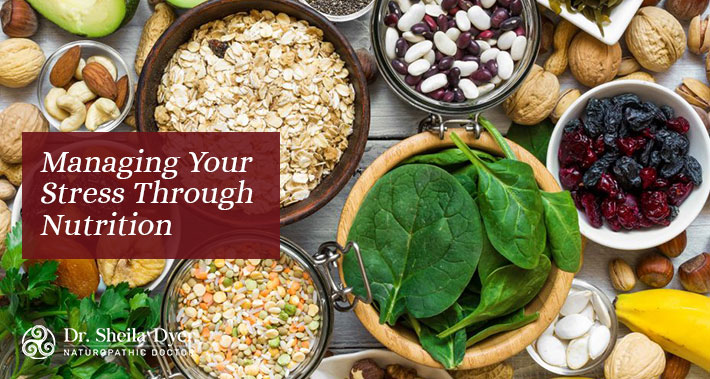When you’re stressed, it can feel like there’s no solution or easy fix.
As a doctor of naturopathic medicine, one of the best ways to manage and prevent stress is through your diet.
By consuming nutrient-rich foods that promote healthy brain and body function, you’re providing your body with a strong, stable foundation.
No matter the cause, nutrition is a key part of natural stress management that can mitigate anxiety and keep you feeling ready to take on the day.
Let’s look at how diet affects your natural stress response, and investigate some ways you can incorporate nutritious stress relieving foods into your lifestyle.
How Your Diet Can Make Your Stress Worse
Your stress levels are directly connected to your diet because the foods you eat impact what happens internally within your body.
Certain foods affect hormone levels in different ways, which can have various effects from impacting your sleep to causing anxiety.
Foods that raise your blood sugar, such as refined carbs, can also result in stress.
Cortisol, ghrelin, and insulin are three hormones your body releases when feeling stressed, which boost both appetite and unhealthy cravings & makes the cycle difficult to break.
But what exactly is stress?
Think of it as your body’s natural alarm system, one which is set off by the release of these hormones.
Mindfully consuming a low-stress diet is the best preventative measure, and nutritional counselling is a great option to help you get started.
But what foods should be eating if you’re looking to manage your stress levels?
Nutrients That Can Reduce Stress
Nutrients are the building blocks your body needs to support a stress-free body and brain.
Here are our top five must-have dietary choices to help you manage stress.
1. Magnesium
The relationship between magnesium deficiency and stress has been documented through studies in mice, with low magnesium levels resulting in depression and anxiety.
Because of how this mineral affects so many different bodily processes, there are several theories as to why magnesium has such a strong effect on many conditions.
These include fibromyalgia& chronic fatigue syndrome, and both physical and mental stress.
Magnesium supports neurotransmission and affects hormones, ultimately having a positive impact on stress pathways.
It has been observed that stress is associated with lack of magnesium as well as high magnesium excretion, meaning stress affects how your body absorbs this nutrient.
This is why it’s important to ensure you’re purposefully getting enough magnesium to avoid the cycle of stress and deficiency exacerbating each other.
Dietary Sources Of Magnesium
Because your body doesn’t naturally produce magnesium, you should make sure you’re getting enough in your diet every day.
Magnesium content in food is directly related to the magnesium content of the soil it was grown in.
In Canada we are seeing wide spread magnesium deficiency most likely related to our soil quality.
If you need, I can recommend a good quality magnesium supplement.
Some dietary sources of this mineral include:
- Bananas
- Dark leafy greens such as spinach and kale
- Soybeans and other legumes
- Salmon
2. Omega-3 Fatty Acids
It used to be a widely popular belief that fats are unhealthy, but we’ve since established some fats are very beneficial for your health.
Omega-3 polyunsaturated fatty acids are essential fats that cannot be synthesized, or produced within your body.
This means diet (and supplements) are your body’s only source of omega-3s.
These fatty acids have proven to have preventative benefits on both anxiety and mood by regulating anti-inflammation, neurotransmission, and other important functions.
Omega-3s can keep stress hormone levels in check while also preventing heart disease and lowering cholesterol and inflammation.
Dietary Sources Of Omega-3’s
The best dietary source of omega-3 fatty acids is fatty fish, such as salmon and tuna.
Other good sources are the smaller fish like sardines, herring an anchovies.
The other two fish worth mentioning are lake trout and mackerel.
Nuts, seeds, and avocados are also a great way to incorporate these nutritious fats into your diet.
Certain other foods may be fortified with omega-3’s, including eggs and non-dairy milk alternatives.
3. Vitamin C
Vitamin C or ascorbic acid, an antioxidant your body requires but cannot produce on its own, plays an important role in preventing stress.
Antioxidants inhibit oxidation, which is a chemical reaction that produces free radicals and causes cell damage.
By combating oxidative stress, vitamin C can relieve symptoms of stress and anxiety.
If you have a stressful situation or task in your future, consider consuming a supplement or foods high in vitamin C.
Research has shown this vitamin can beeffective in relieving anxiety levels and the uncomfortable symptoms of stress and anxiety, such as rapid heart rate and blood pressure.
Additionally, vitamin C strengthens your immune system and regulates stress hormone levels.
Dietary Sources Of Vitamin C
There are many healthy sources of vitamin C you can easily add to your daily routine.
Some of the foods rich in vitamin C include:
- Citrus — oranges, lemons, and limes
- Kiwis
- Broccoli and cauliflower
- Red, green, and yellow peppers
- Tomatoes
Most fruit juices either naturally have, or are fortified with, vitamin C as well.
However, these are not ideal due to their general high sugar content.
4. Vitamin D
Vitamin D affects more than just bone health.
It can also stabilize your mood and help relieve muscle tension.
The effect of vitamin D on brain function and stress has been well documented, with low vitamin D levels being connected to acute stres.
Studies where various individuals are supplemented with vitamin D to relieve anxiety, mood imbalances, and depression have shown definite improvement time and time again, which further cements the important role this vitamin plays in our overall health and especially in our brain function.
With Canadians experiencing a widespread vitamin D deficiency as a whole, especially during the winter months, it’s important to ensure you’re getting enough.
Dietary Sources Of Vitamin D
Milk and dairy products, especially those fortified with vitamin D, are a great dietary source.
If you’re lactose sensitive or seeking other sources, look for the following:
- Fatty fish
- Egg yolks
- Other vitamin D fortified foods, such as non-dairy milk alternatives
- Mushrooms
5. Honestly, Just Drink More Water
Along with the countless benefits of drinking water, it also helps in the management of stress and anxiety.
Even slight dehydration can boost cortisol levels and trigger your body’s stress response, so make sure you stay well hydrated.
It’s best to aim for about 8 cups, or 2 litres, of water each day.
Your body requires between 2 and 4 litres, but the remaining amount of hydration comes from your diet.
Try carrying a refillable water bottle throughout the day — it may help remind and encourage you to hydrate.
If you find yourself feeling anxious or stressed, pour yourself a glass of water.
This is far from a cure for anxiety, but it’s the simplest way to alleviate your symptoms.
Foods To Avoid
Some foods and ingredients are known to trigger stress by causing a spike in your blood sugar or increasing stress hormone levels.
Caffeine is a big stress-inducer that can cause shakiness and anxiety.
Small amounts are typically fine earlier in the day, but large amounts of caffeine should be avoided to mitigate stress.
Alcohol can also greatly impact your stress levels, as well as a number of other chronic conditions.
Because it’s a depressant, alcohol slows down your central nervous system’s processes as well as your brain function.
Although it may seem like a good short-term solution, alcohol can actually compound the effects of stress — so make sure to drink in moderation, especially when you’re feeling anxious.
Lastly, refined sugar can cause stress due to its impact on blood sugar.
When your blood sugar rises sharply and then drops, your body releases more cortisol and may experience an energy and mood crash.
With this crash comes feelings of stress, irritability, worry, and mood swings.
To mitigate stress and help your body thrive, it’s best to avoid these foods.
Book An Appointment With Dr. Sheila
Whether the cause of your stress is within your control or not, you can use nutrition to regulate stress hormones and relieve symptoms from the inside out.
For more information on natural stress management, contact me, Dr. Sheila Dyer.
I would love to work with you and tell you all about naturopathic solutions to help you better cope with the stress life throws at you.
Stress can have disastrous impacts on your health if not addressed, so let’s address it.
Book an appointment with me, Dr. Sheila Dyer, today.
If you have questions about naturopathic medicine, or would like to start with your first consultation, contact me, and let’s book an appointment.
Dr. Sheila Dyer, ND1080 Dovercourt Rd,
Toronto, ON M6H 2X8
(416) 554-5135
► https://g.page/DrSheilaDyerNd
Dr. Sheila Dyer is a Naturopathic Doctor and a practicing registered nurse offering holistic healthcare with a scientific focus

